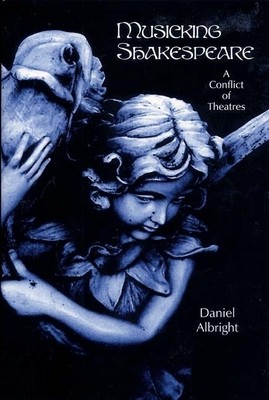
- We will send in 10–14 business days.
- Author: Daniel Albright
- Publisher: University of Rochester Press
- ISBN-10: 1580462553
- ISBN-13: 9781580462556
- Format: 16.2 x 23.1 x 2.6 cm, hardcover
- Language: English
- SAVE -10% with code: EXTRA
Reviews
Description
Demonstrates how Purcell, Berlioz, Verdi, and Britten, responding to Shakespeare's juxtaposition of contrasting theatrical styles, devised music dramas that call opera into question.
In this book, Daniel Albright, one of today's most intrepid and vividly communicative explorers of the border territory between literature and music, offers insights into how composers of genius can help us to understand Shakespeare.Musicking Shakespeare demonstrates how four composers -- Purcell, Berlioz, Verdi, and Britten -- respond to the distinctive features of Shakespeare's plays: their unwieldiness, their refusal to fit into interpretive boxes, their ranting quality, their arbitrary bursts of gorgeousness. The four composers break the normal forms of opera -- of music altogether -- in order to come to terms with the challenges that Shakespeare presents to the music dramatist.
Musicking Shakespeare begins with an analysis of Shakespeare's play The Tempest as an imaginary Jacobean opera and as a real Restoration opera. It then discusses works that respond with wit and sophistication to Shakespeare's irony, obscurity, contortion, and heft: Berlioz's Roméo et Juliette, Verdi's Macbeth, Purcell's The Fairy Queen, and Britten's A Midsummer Night's Dream.
These works are problematic in the ways that Shakespeare's plays are problematic. Shakespeare's favorite dramatic device is to juxtapose two kinds of theatres within a single play, such as the formal masque and the loose Elizabethan stage. Thefour composers studied here respond to this aspect of Shakespeare's art by going beyond the comfort zone of the operatic medium. The music dramas they devise call opera into question. Daniel Albright is the Ernest Bernbaum Professor of Literature at Harvard University.
EXTRA 10 % discount with code: EXTRA
The promotion ends in 21d.00:33:08
The discount code is valid when purchasing from 10 €. Discounts do not stack.
- Author: Daniel Albright
- Publisher: University of Rochester Press
- ISBN-10: 1580462553
- ISBN-13: 9781580462556
- Format: 16.2 x 23.1 x 2.6 cm, hardcover
- Language: English English
Demonstrates how Purcell, Berlioz, Verdi, and Britten, responding to Shakespeare's juxtaposition of contrasting theatrical styles, devised music dramas that call opera into question.
In this book, Daniel Albright, one of today's most intrepid and vividly communicative explorers of the border territory between literature and music, offers insights into how composers of genius can help us to understand Shakespeare.Musicking Shakespeare demonstrates how four composers -- Purcell, Berlioz, Verdi, and Britten -- respond to the distinctive features of Shakespeare's plays: their unwieldiness, their refusal to fit into interpretive boxes, their ranting quality, their arbitrary bursts of gorgeousness. The four composers break the normal forms of opera -- of music altogether -- in order to come to terms with the challenges that Shakespeare presents to the music dramatist.
Musicking Shakespeare begins with an analysis of Shakespeare's play The Tempest as an imaginary Jacobean opera and as a real Restoration opera. It then discusses works that respond with wit and sophistication to Shakespeare's irony, obscurity, contortion, and heft: Berlioz's Roméo et Juliette, Verdi's Macbeth, Purcell's The Fairy Queen, and Britten's A Midsummer Night's Dream.
These works are problematic in the ways that Shakespeare's plays are problematic. Shakespeare's favorite dramatic device is to juxtapose two kinds of theatres within a single play, such as the formal masque and the loose Elizabethan stage. Thefour composers studied here respond to this aspect of Shakespeare's art by going beyond the comfort zone of the operatic medium. The music dramas they devise call opera into question. Daniel Albright is the Ernest Bernbaum Professor of Literature at Harvard University.


Reviews